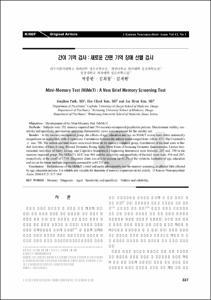간이 기억 검사:새로운 간편 기억 장애 선별 검사
- Keimyung Author(s)
- Kim, Hee Cheol
- Department
- Dept. of Psychiatry (정신건강의학)
- Journal Title
- 신경정신의학
- Issued Date
- 2004
- Volume
- 43
- Issue
- 3
- Abstract
- Objectives:Development
of the Mini-Memory Test (MiMeT). Methods:Subjects were 332 memory-impaired and 354 memory-unimpaired psychiatric patients. Discriminant validity, sensitivity and specificity, and receiver operating characteristic curve were employed for the validity test. Results:In the memory-unimpaired group, the effects of age, education and sex on MiMeT scores were either statistically insignificant or negligiblely little if significant. Correlations between the subtest scores ranged from .444 to .673. The Cronbach’s α was .790. The subtest and total scores were much lower in the memory-impaired group. Correlations of the total score to Barthel Activities of Daily Living, Blessed Dementia Rating Scale, Short Form of Samsung Dementia Questionnaire, Lawton Instrumental Activities of Daily Living, and Cognitive Impairment Diagnosing Instrument were between .287 and .790 in the memory-impaired group. The MiMeT’s AUC was .964 and the sensitivity and specificity of the total score were .916 and .887, respectively, at the cutoff of 17/18. Diagnosis alone was able to account for 61.2% of the variation. Inclusion of age, education and sex in the linear multiple regression increased it to 63.5% only. Conclusion:Performances of the MiMeT, a brief and easily administrable test for memory screening, is affected little affected by age, education and sex. It is reliable and valuable for detection of memory impairment in the elderly.
- Alternative Title
- Mini-Memory Test (MiMeT):A New Brief Memory Screening Test
- Keimyung Author(s)(Kor)
- 김희철
- Publisher
- School of Medicine
- Citation
- 박종한 et al. (2004). 간이 기억 검사:새로운 간편 기억 장애 선별 검사. 신경정신의학, 43(3), 337–344.
- Type
- Article
- ISSN
- 1015-4817
- Appears in Collections:
- 1. School of Medicine (의과대학) > Dept. of Psychiatry (정신건강의학)
- 파일 목록
-
-
Download
 oak-bbb-4720.pdf
기타 데이터 / 460.87 kB / Adobe PDF
oak-bbb-4720.pdf
기타 데이터 / 460.87 kB / Adobe PDF
-
Items in Repository are protected by copyright, with all rights reserved, unless otherwise indicated.